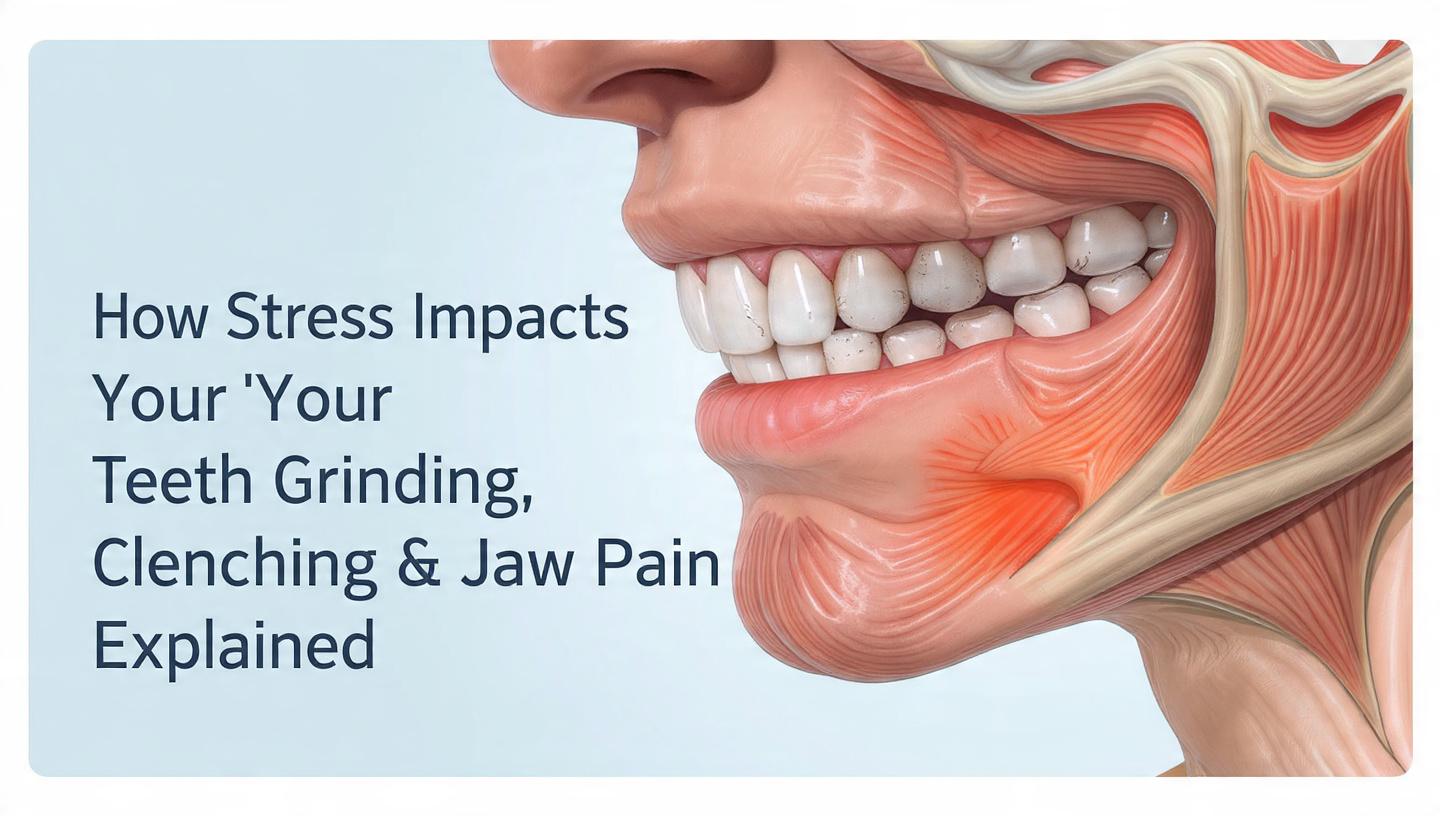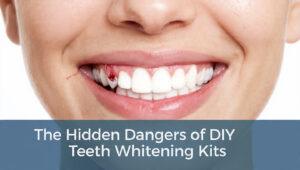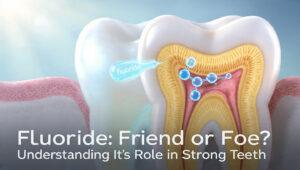Stress doesn’t just affect your mind. It affects your body in ways you often don’t notice — especially your teeth and jaw. Many people grind their teeth or clench their jaw without realizing it, particularly during sleep or moments of tension. Over time, this silent habit can cause tooth damage, headaches, jaw pain, and even changes in your bite.
Let’s explore how stress impacts your teeth, what signs to look for, and how to protect your smile from stress-related damage.
What Is Stress-Related Teeth Grinding?
Teeth grinding, also called bruxism, is an involuntary action where you grind, clench, or tightly press your teeth together. It happens most commonly when you are stressed, anxious, frustrated, or deeply focused.
There are two types:
- Awake bruxism: grinding or clenching during the day
- Sleep bruxism: grinding at night, often without noticing
Sleep bruxism is usually more harmful because it happens intensely and repeatedly.
Why Stress Makes You Grind Your Teeth
When you feel stressed or anxious, your body enters “fight-or-flight” mode. This increases muscle tension, especially in the jaw. That tension often becomes a habit, leading to unconscious clenching and grinding.
Common triggers include:
- Work pressure
- Relationship or family stress
- Deadlines
- Anxiety disorders
- Poor sleep
- Anger or frustration
- Overthinking
If these issues continue for long periods, bruxism becomes a daily habit.
Signs That Stress Is Affecting Your Teeth
You may not notice you grind your teeth, but your body gives clear signals. Look out for:
✔ Jaw pain or tightness
A constant ache near your ears or cheeks may indicate overworked jaw muscles.
✔ Morning headaches
Grinding at night strains head and neck muscles, leading to dull headaches.
✔ Worn-down teeth
Flattened, chipped, or cracked teeth are major signs of bruxism.
✔ Tooth sensitivity
Enamel wears away due to grinding, exposing dentin and causing sensitivity.
✔ Neck and shoulder pain
Jaw tension often radiates to nearby muscles.
✔ Temporomandibular Joint (TMJ) pain
Stress can inflame the jaw joint, leading to clicking, popping, or difficulty opening the mouth.
If you consistently notice these symptoms, it’s time to get your teeth evaluated.
How Stress Damages Your Teeth and Jaw
1. Enamel Wear
Grinding slowly erodes the protective enamel, making your teeth weaker and more prone to cavities.
2. Cracked or Broken Teeth
Continuous pressure can cause fractures, chips, or cracks that require fillings, crowns, or even root canal treatment.
3. Gum Recession
Constant clenching puts pressure on the gums, causing them to pull back.
4. TMJ Disorders
Jaw clenching strains the temporomandibular joint, leading to:
- Pain
- Clicking sounds
- Lockjaw
- Difficulty chewing
5. Poor Sleep Quality
Night grinding disrupts sleep, leading to fatigue and increased stress — a cycle that gets worse without treatment.
How Dentists Diagnose Stress-Related Grinding
A dentist can easily spot signs during an examination. They may look for:
- Flattened teeth
- Enamel loss
- Cracks
- Jaw muscle tenderness
- Gum recession
Sometimes, digital X-rays are used to detect deeper damage.
Effective Treatments for Teeth Grinding & Jaw Clenching
Treating bruxism involves addressing both the dental damage and the stress that causes it.
1. Night Guard (Mouth Guard)
A custom night guard is one of the best treatments. It protects your teeth from friction while you sleep and reduces jaw pressure.
2. Stress Management
Improving emotional health helps reduce grinding. Helpful methods include:
- Light exercise
- Deep breathing
- Meditation
- Adequate sleep
- Therapy or counseling
3. Jaw Exercises
Stretching and strengthening jaw muscles can reduce tightness and pain.
4. Dental Repairs
If teeth are damaged, your dentist may recommend:
- Fillings
- Crowns
- Bonding
- Root canal (only if needed)
5. Treating TMJ Issues
Warm compress, anti-inflammatory medication, or TMJ therapy may be recommended.
How to Protect Your Teeth from Stress-Related Damage
Here are simple habits to reduce grinding:
✔ Avoid chewing gum
✔ Avoid biting nails or pen caps
✔ Maintain correct posture
✔ Keep your lips closed and teeth slightly apart
✔ Avoid caffeine before bed
✔ Practice jaw relaxation techniques
Small changes can make a big difference.
Final Thoughts
Stress is a part of life, but it shouldn’t damage your teeth. Grinding and clenching often go unnoticed until they cause real pain or tooth wear. The earlier you identify the signs, the easier it is to protect your smile.
If you suspect stress is affecting your teeth or jaw, a quick dental consultation can help you prevent long-term damage and restore comfort.



